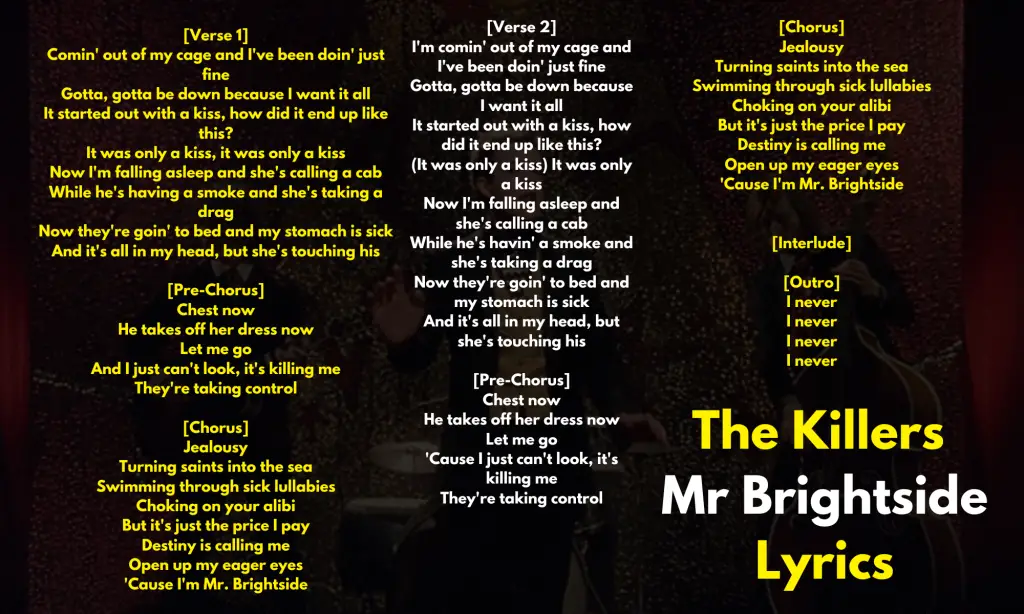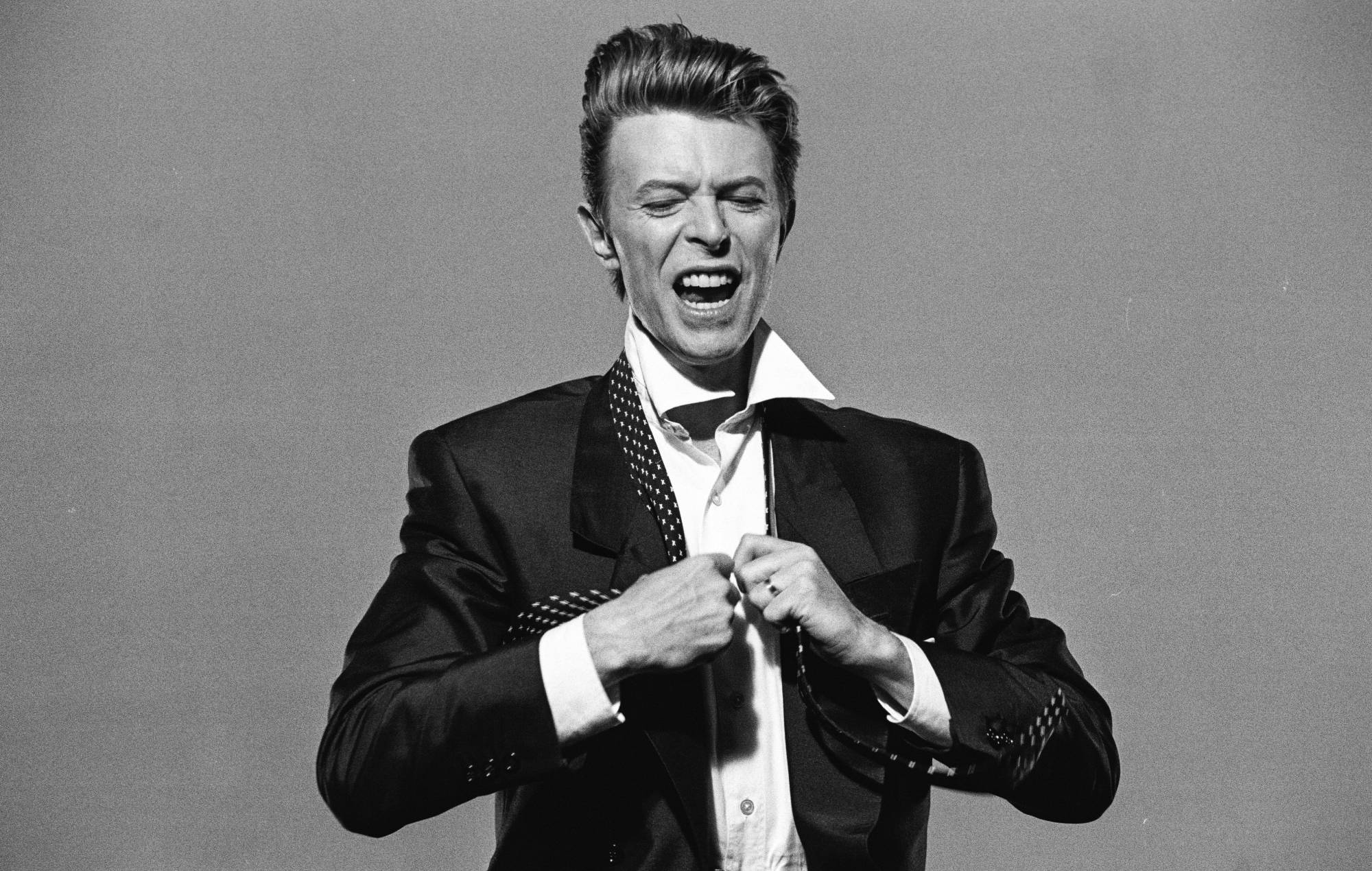Table of Contents
Image C/O ‘Mr. Brightside’ Music Video, The Killers, and Island Records
Since its release in 2003, “Mr. Brightside” by The Killers has grown from a breakout hit to a cultural anthem, making its way into everything from late-night karaoke playlists to stadium-wide singalongs. Recently, the Buffalo Bills adopted it as their unofficial victory anthem, and videos of fans screaming the lyrics in freezing temperatures at Highmark Stadium have only added to the song’s legacy.
But what gives “Mr. Brightside” its staying power? Why has it spent over 390 weeks on the UK singles chart, becoming a record-breaking staple of modern music?
To me, the answer lies in the emotional weight of the lyrics.
While the song’s upbeat tempo and unforgettable riff draw people in, the story it tells—of jealousy, heartbreak, and self-deception—keeps it relevant. Brandon Flowers wrote the song after discovering his girlfriend was cheating on him, and you can feel the rawness of that experience in every line. But these lyrics tell more than a personal story as they tap into themes of love and betrayal that are as old as storytelling itself. With my background in English literature and creative writing, I want to dig deeper into these lyrics, sharing my own thoughts and exploring how “Mr. Brightside” connects with the timeless emotions found in some of the greatest works of poetry and fiction.
“Mr. Brightside” At a Glance
- A Story Rooted in Reality: Inspired by Brandon Flowers catching his girlfriend cheating, the song tells a personal yet universal story of heartbreak and obsession.
- An Anthem for the Ages: Its gripping lyrics and unrelenting energy make it a staple everywhere from weddings to stadiums, where it’s become the Buffalo Bills’ victory anthem.
- Timeless Themes That Hits: The song’s focus on jealousy, longing, and self-deception mirrors emotions explored in art and literature for centuries.
The Killers Mr Brightside Lyrics

Mr Brightside Meaning
“Comin’ out of my cage, and I’ve been doin’ just fine”
The song begins with a bold statement: “Comin’ out of my cage, and I’ve been doin’ just fine.” Right away, we’re introduced to someone who has recently stepped out of their comfort zone. This might be someone who’s usually introverted, now trying to embrace life and take chances. The narrator wants more from life, as shown in “Gotta, gotta be down, because I want it all.” The excitement of wanting it all is clear, but so is the danger. When you aim for everything, it’s easy to lose control if things don’t go as planned.
This tension between hope and insecurity feels very real. At first, the narrator is optimistic, but you can already sense cracks forming. The idea of wanting too much and not being ready for it reminds me of John Clare’s “I Am.” In that poem, Clare writes, “I am the self-consumer of my woes.” Just like Clare’s speaker, the narrator is struggling to balance his desires and the heavy emotions that come with them.
This opening line also sets the pace for the rest of the song. The upbeat tempo mirrors the energy of someone stepping into a new, unpredictable world. But there’s also a frantic edge to it, hinting at how quickly things can spiral.
“It started out with a kiss, how did it end up like this?”
This is one of the most memorable lines in the song. The narrator is reflecting on a moment that should have been small—just a kiss—but for him, it’s huge. That kiss represents a big step forward, something thrilling and new. But then, the excitement turns into confusion and heartbreak: “How did it end up like this?” He keeps repeating, “It was only a kiss,” as if trying to convince himself that it shouldn’t matter so much.
This moment reminds me of Christina Rossetti’s “In an Artist’s Studio,” where she writes, “He feeds upon her face by day and night.” In both the song and the poem, we see someone fixating on a single moment or image, turning it over in their mind again and again. Just like the artist in Rossetti’s poem, the narrator in “Mr. Brightside” can’t let go of what happened, even though he knows it’s unhealthy.
What makes this lyric so powerful is how relatable it is. Who hasn’t replayed a moment over and over, wondering where things went wrong? The repetition of this line mirrors that obsessive thinking, making the listener feel the narrator’s pain and confusion.
“Now they’re going to bed, and my stomach is sick”
Here, the jealousy starts to take over completely. The narrator imagines his love interest with someone else: “Now they’re going to bed, and my stomach is sick.” He’s not just sad—he feels physically ill. That visceral reaction shows how deeply he’s affected by what he sees (or imagines). The line “And it’s all in my head, but she’s touching his” adds another layer. He admits that these thoughts might not even be real, but that doesn’t make them any less painful.
This is a perfect example of how jealousy can mess with your mind. It reminds me of Hardy’s “The Ruined Maid,” where jealousy and longing are also key themes. In that poem, Hardy’s narrator envies another character’s life, saying, “Your clothes are amazin’, yet these were no riches.” Just like Hardy’s speaker, the narrator in “Mr. Brightside” compares himself to someone else and feels like he’s come up short.
The detailed imagery—“Now I’m falling asleep, and she’s calling a cab / While he’s having a smoke, and she’s taking a drag”—makes it feel real, even if it’s all in his head. That’s what makes this lyric so heartbreaking. Whether it’s true or not, the jealousy feels real, and the narrator can’t escape it.
“Let me go, I just can’t look, it’s killing me”
In this line, the narrator’s desperation is clear: “Let me go, I just can’t look, it’s killing me.” He knows he’s stuck in a loop of jealousy and obsession, but he doesn’t know how to break free. The plea “Let me go” could be directed at himself, the woman he desires, or even the imagined situation. No matter who it’s aimed at, it shows how trapped he feels.
This moment makes me think of Clare’s line from “I Am,” where he writes, “I long for scenes where man has never trod, a place where woman never smiled or wept.” Both Clare and the narrator of “Mr. Brightside” want to escape—not just from their circumstances but from their own emotions. But there’s no easy way out when jealousy and heartbreak take over.
The music here mirrors the lyrics perfectly. The rising tension in the melody matches the narrator’s growing panic. It’s like a rollercoaster climbing to the peak, with no way to stop the plunge that’s coming next.
“Jealousy, turning saints into the sea”
The chorus brings everything to a head: “Jealousy, turning saints into the sea.” This line paints jealousy as a force that can corrupt anyone, no matter how pure or good they are. It’s a tidal wave of emotion, sweeping away logic and self-control. The imagery here—“Swimming through sick lullabies, choking on your alibi”—is vivid and haunting, showing how the narrator is drowning in his own thoughts.
This theme of jealousy as a destructive force is something we also see in Rossetti’s “In an Artist’s Studio.” The artist’s obsession with his muse consumes him, just like the narrator of “Mr. Brightside” is consumed by his jealousy. In both cases, the focus on someone else’s actions (or imagined actions) leads to self-destruction.
What stands out in this chorus is how universal it feels. Jealousy is something almost everyone has experienced, and this lyric captures its overwhelming power. It’s a reminder of how quickly emotions can take control, turning even the best of us into something unrecognizable.
“I never, I never, I never…”
The song ends on a haunting, unfinished note: “I never, I never, I never…” It’s like the narrator is trying to say something important but can’t quite get it out. This unresolved ending mirrors the way heartbreak and jealousy often leave us feeling—stuck, with no sense of closure.
This moment reminds me of Hardy’s “The Ruined Maid” again. In that poem, there’s no resolution for the narrator’s jealousy or longing. Similarly, in “Mr. Brightside,” the narrator can’t move on. The repeated “I never” feels like a thought he’s destined to repeat forever, just like the rest of the song’s cyclical structure.
In my opinion, this is one of the most powerful parts of the song. It doesn’t give us a clean ending or an easy solution. Instead, it leaves us sitting with the narrator’s emotions, feeling his pain and longing right alongside him.
Connecting All Of The Dots Here
“Mr. Brightside” is all about emotional chaos, especially when jealousy grabs hold and won’t let go. The lyrics feel like someone stuck in their own head, replaying the same painful moments over and over. Brandon Flowers wrote it after seeing his girlfriend with another guy, and that real-life betrayal drives the whole song. You hear it in lines like, “It started out with a kiss, how did it end up like this?” It’s not just frustration—it’s disbelief. That obsessive need to untangle what happened, even though it hurts, reminds me of John Clare’s “I Am.” Clare writes, “I am the self-consumer of my woes,” which is exactly how it feels when you can’t stop turning the same moment over in your mind.
Then there’s jealousy—the real star of the song. “Jealousy, turning saints into the sea,” paints it as a force that corrupts everything it touches. It twists the narrator’s thoughts, warping what might be true and what’s imagined. That same destructive obsession shows up in Christina Rossetti’s “In an Artist’s Studio,” where the artist fixates on his muse to the point of erasing her individuality. Rossetti writes, “He feeds upon her face by day and night,” which feels a lot like how the narrator in “Mr. Brightside” can’t stop obsessing over this imagined betrayal. Both works highlight how jealousy can make you lose sight of reality, pulling you deeper into your own insecurities.
Finally, the song’s repetition hammers home its biggest takeaway: heartbreak doesn’t tie itself up neatly. The same verse plays twice, and the ending—*“I never, I never, I never”—*is left unfinished, like a thought the narrator can’t quite complete. That lack of closure mirrors Thomas Hardy’s “The Ruined Maid.” In Hardy’s poem, the narrator envies someone else’s seemingly perfect life but knows there’s a cost to it. Similarly, “Mr. Brightside” shows how longing and jealousy trap you in an endless loop, where no amount of reasoning makes it better. Like the great works of literature it parallels, the song is about how human emotions are messy, relentless, and timeless.
The post The Killers Mr Brightside Lyrics And Meaning: A Study of Obsession and Loss appeared first on Magnetic Magazine.



